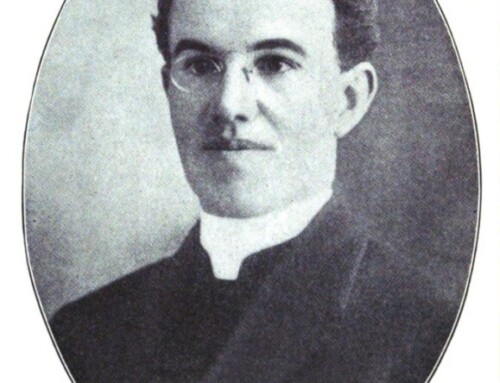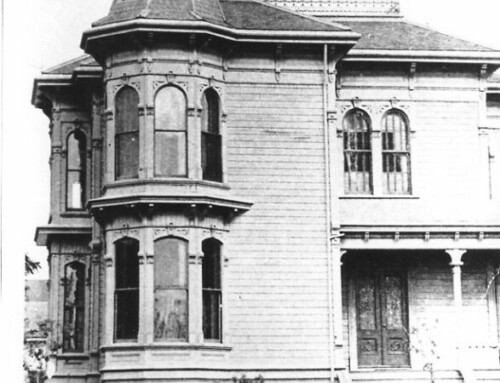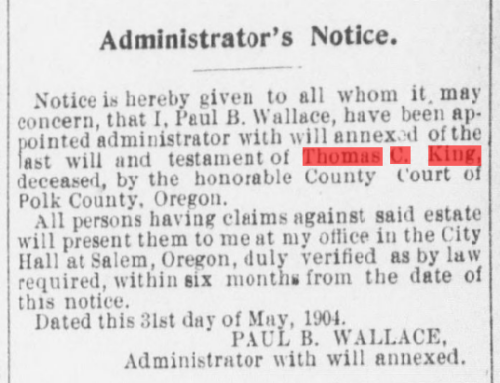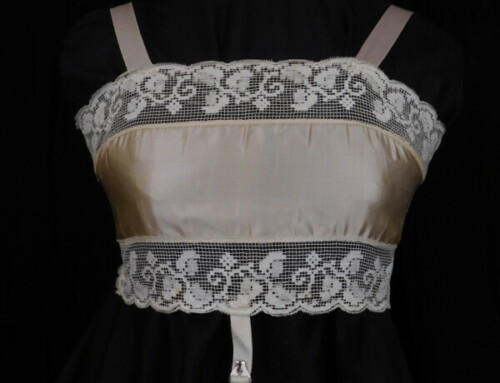In cataloging what, by all appearances, looked like very run-of-the mill Christmas Postcards, I came across this little gem. In neat, crisp handwriting Thekla Goehring writes to her friend Renska Swart:
Dearest Friend,
How are you, haven’t had the “Flu” have you? The quarantine has been on here for all but 3 weeks since the beginning of Oct., the ban having just been lifted since Sunday. Have you been so very busy? Haven’t heard for so long. So glad the war is over, but my brother, who is Capt. in the Medical Corps now in France will not be sent home for some time. Lovingly,
Thekla Goehring
Postmarked December 16, 1918, Grand Island, Nebraska.
The postcard (WHC 0063.001.0021.016.11), now in the Willamette Heritage Centers collections, features a cheery illustration of a child picking up Christmas Trees on a sled pulled by a comically undersized beagle. The light tone belies the heavy and perhaps familiar issues facing the writer that year.
The Flu
December, 1918. The world was in the grips of another global pandemic – the Spanish Flu – which infected about 500 million and killed 50 million people worldwide,[1] a milestone we are thankfully far short of in our present pandemic on a worldwide scale.[2] The United States, however, has already exceeded its losses from the Spanish Flu Epidemic.[3]
The closures, quarantines, disruption of business, strain on healthcare workers and systems, and loss of loved ones we have experienced today would have been familiar to Thekla and Renska. The same day Thekla mailed her postcard, Renska could have opened the morning paper to read about the Eugene mayor issuing an order forbidding all public and private dances, believed to be “more conducive to the spread of the contagion than other gatherings.”[4] Salem Mayor Keyes would issue a similar order just a few weeks later hoping to curtail any large New Year’s celebrations.[5] In Dallas (Oregon) that week cases had skyrocketed, the paper reported that local physicians had been “taxed to the limit in caring for the sick” and that “every available nurse in the city, Salem and Portland has been employed on the cases and in addition to these, prominent Dallas women have volunteered to help wherever needed.”[6] Colored placards on the front doors of Salem houses marked quarantines on infected households and permits were required for inhabitants to leave.[7] Tragic losses mounted. Obituaries filled the paper describing the deaths, including those of Mrs. N.A. Beach, a mother of 8 children from Dallas[8] and Catherine Fowle, a 22-year-old, 4th grade teacher at Washington Elementary School in Salem.[9] And lest you think there wasn’t pushback on public health measures a century ago, when rising cases in Silverton prompted city health officer Peter A. Loar to issue an order to “close up theaters, churches and the like, as was done in Salem a few weeks ago. The [Silverton City Council] unanimously opposed the action.”[10]
The World at War
If the pandemic wasn’t enough, the world was just coming out of the First World War and many were dealing with another kind of loss and separation. As Thekla mentions, even though the war was finally over, the armistice being signed the month before, the family was still waiting for her brother, Captain Carl Goehring to come home. The family had received a letter from Carl describing some of his experiences in September that year. He raved over his good fortune of going to “bed a few nights ago with old time formality for the first time since I visited you. The officers car was switched off of our troop train by mistake and a lay over enabled us to get a nice large room with rugs, electric lights, mirrors, water to wash in etc. But you had to get out and leave on the 5:30 am train, which was indeed a hard job. The climate is very moist and colds are numerous.”[11]
Anti-German Sentiment
Thekla is amazingly silent on another issue facing her family earlier that year as well. In May, Thekla’s brother Richard was censured by the Council of Defense, “charged with unpatriotic conduct” in relationship to comments he had made about “American soldiers and sailors.”[12] The entire episode, relayed in a few short newspaper articles, leaves a lot of questions. How could a man whose own brother was serving in France, be accused of not being “loyal or patriotic in his support of the government”?[13] The details are sketchy at best and point to a period of heightened tensions.
The Goehring family was German. Father, also Richard Goehring, had immigrated to the U.S. in about 1873[14] and mother Pauline a few years later.[15] Being of German ancestry during WWI brought its own kind of trouble. Richard Goehring was naturalized, otherwise he would have had to submit to registration of all “German Aliens” held at the Grand Island City Hall in February 1918.[16] The children of the family by nature of their birth in the U.S. were considered full citizens.
The incident occurred on March 4, 1918, when the Richard Goehring Jr.’s office at the Hoagland Lumber company and the Grand Island Liederkranz (German singing/social club) building[17] were defaced. The local high school was broken into and all the German-language books burned.[18] A note on the Liederkranz door read: “We advise you to change the name of your society or we will change it for you. Also we suggest that you have a general clean-up of your pro-German members. We take this means of notifying you and expect immediate results. This is the beginning of the end – by order of the K.K.K.” Yes, that K.K.K. The vandalism was attributed to remarks purportedly made by Richard Goehring, Jr., as a troop train from California worked its way through town a few days prior. Convoluted reporting suggests that Goehring was overheard saying that the “—-should have remained a home.” Richard Jr. denied saying anything negative about the soldiers. His recollection of events include him making a remark “to the effect that it was a fine bunch of boys and it was a pity to contemplate that it was possible that such a lot of men might be sunk by a submarine. ‘This remark,’ said Mr. Goehring, ‘may have been twisted about but I have never said anything about any American soldiers or sailors that anyone could reasonably object to.’” Several townspeople also went on record defending Mr. Goehring, saying they had never heard any disparaging remarks about the war from him.[19] Despite the denials and subsequent apologies, Goehring was censured.
The reporting leaves much to be desired in terms of details. The reporter at the censure hearing states “additional testimony was presented with reference to some remarks Mr. Goehring [made] in Hastings which Mr. Goehring practically admitted, acknowledged that they should not have been made, and expressed regret that they were made.” The censure, while official, does not seem to have too many long-term repercussions. The family continued to live in Grand Island until relocating to California in 1936.[20]
Captain Carl Goehring eventually returned to his family, but it would take another seven months.[21] He went on to a distinguished medical career as a pathologist and surgeon with, presumably, as many carpets, electric lights and fresh water to wash as he could hope for.[22]
Thekla, despite having a really hard year, still found time to send a celebratory card to her friend in Oregon and to lovingly wish her a happy Yuletide. May we all take our celebrations where, when and how we can.
Citations
[1] CDC factsheet on the Spanish Influenza epidemic: https://www.cdc.gov/flu/pandemic-resources/1918-commemoration/1918-pandemic-history.htm
[2] As of 12/23/2021 per the Our World in Data research site maintained by the University of Oxford Martin Oxford School https://ourworldindata.org/coronavirus-data, worldwide infections are listed as 277 million with deaths at 5.38 million.
[3] It should be noted that deaths from the COVID-19 in the United States alone are listed as 810 thousand as of December 23,2021,, which is higher than the number of deaths in the United States attributed to the Spanish Flu (according to CDC records, there were 675,000 deaths in the United states from the Spanish Flu. https://www.cdc.gov/flu/pandemic-resources/1918-commemoration/1918-pandemic-history.htm)
[4] “Quarantine is Being used to Fight the Flu.” Oregon Statesman 12 Dec 1918 pg 2.
[5] “Dances Halt by Order of Mayor Keyes.” Oregon Statesman. 29 Dec 1918 pg 1.
[6] “Dallas Still in Grip of Spanish Influenza.” Oregon Statesman 15 Dec 1918 pg 14.
[7] “Dances Halted By Order of Mayor Keyes.” Oregon Statesman 29 Dec 1918 pg 1
[8] “Mother of Eight is Victim of Influenza at Dallas.” Oregon Statesman 07 Dec 1918 pg 2.
[9] “Miss Fowle Passes Away.” Oregon Statesman 27 Dec 1918 pg 1.
[10] “Silverton in Tangle of Influenza Closing Order.” Oregon Statesman. 11 Dec 1918 pg 2
[11] “Letters from France.” Grand Island Herald. 24 Oct 1918 page 8. Transcription of a letter to Carl Goehring’s parents dated 28 Sept 1918.
[12] “Censure Vote Final Outcome” Grand Island Daily Independent. 20 May 1918 pg 4.
[13] “Censure Vote Final Outcome” Grand Island Daily Independent. 20 May 1918 pg 4.
[14] 1910 Federal Census Grand Island, Ward 2, Hall, Nebraska lists immigration date as 1875, but his US Passport application in 1908 lists 1873 and gives boat name, so using that one.
[15] 1910 Federal Census Grand Island, Ward 2, Hall, Nebraska lists immigration date as 1880.
[16] “Notice to German Aliens” Grand Island Daily Independent 25 Jan 1918 pg 3
[17] See a picture and learn the history of the group in Grand Island here: https://en.wikipedia.org/wiki/Liederkranz_(Grand_Island,_Nebraska)
[18] “City Stirred by Paintings.” Grand Island Daily Independent. 05 Mar 1918 pg 1
[19] “City Stirred by Paintings.” Grand Island Daily Independent. 05 Mar 1918 pg 1
[20] Obituary. Wilmington Daily Press Journal. 01 Oct 1951 pg 3. 1930 US Federal Census Grand Island, Hall Nebraska; 1920 US Federal Census, Grand Island, Hall, Nebraska
[21] US Army Transport Service Arriving and Departting Passenger Lists. Ancestry.com. Shows Carl departing France aboard the USS Princess Matoika from St. Nazerne France June 12, 1919.
[22] Obituary. Pittsburgh Press. 24 Aug 1962 pg 30. He worked at St. Francis Hospital in Pittburgh, the Mayo Clinic and as a surgeon for the Wheeling Steel Corporation in addition to his private practice and served as a lecturer for the University of Pittsburgh.








Leave A Comment